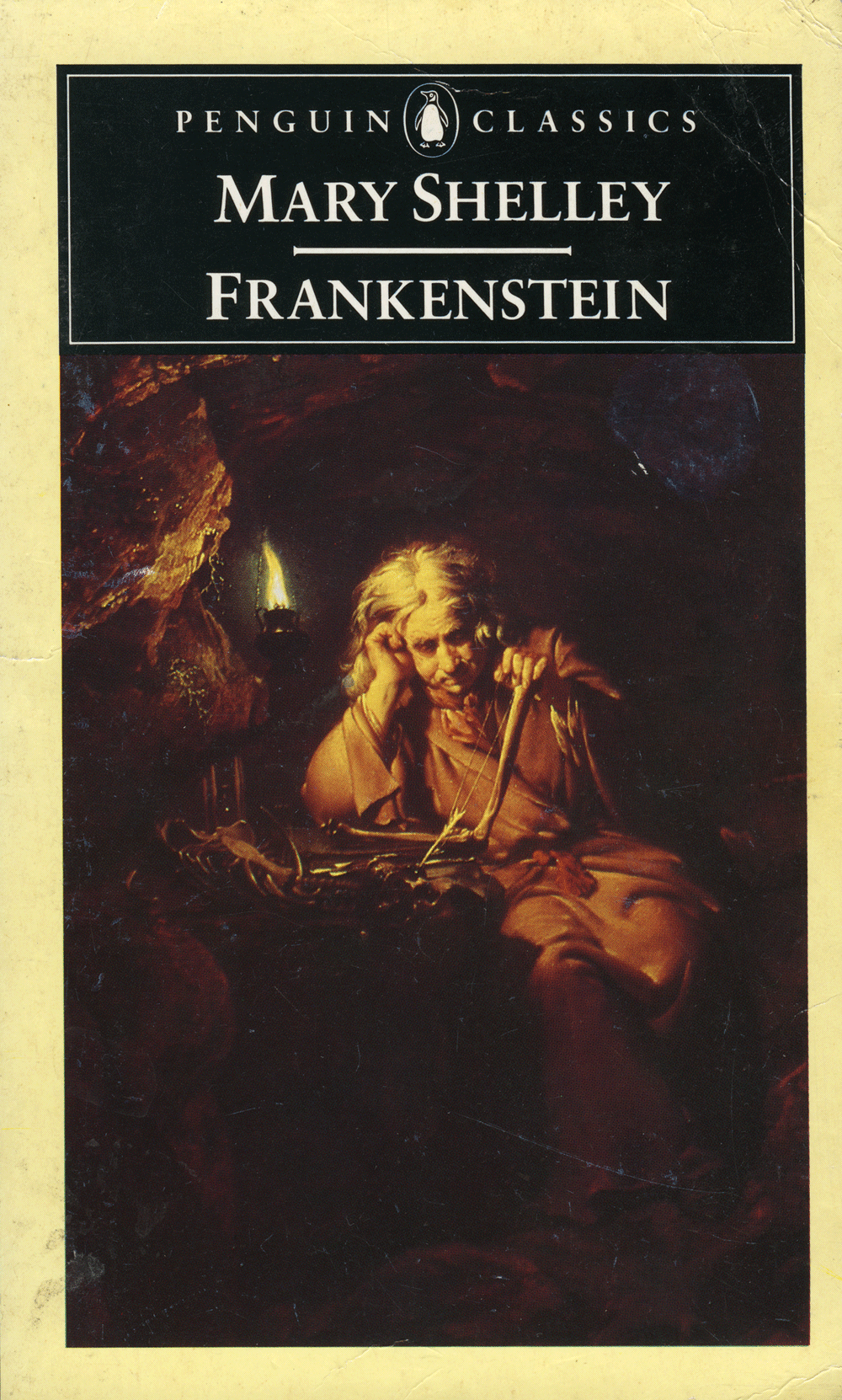Our book group choice for October 2013 is Frankenstein by Mary Shelley. At once a Gothic thriller, a passionate romance, and a cautionary tale about the dangers of science, Frankenstein tells the story of committed science student Victor Frankenstein.
Frankenstein; or, The Modern Prometheus is an 1818 novel written by English author Mary Shelley (born 1797). The story follows Victor Frankenstein, a young scientist who creates a sapient creature in an unorthodox scientific experiment. Shelley started writing the story when she was 18, and the first edition was published anonymously in London on 1 January 1818, when she was 20. Her name first appeared in the second edition, which was published in Paris in 1821.
The novel has been adapted numerous times for stage, film, and television. It has also been the subject of much critical analysis, with scholars examining themes such as the nature of good and evil, the dangers of scientific hubris, and the relationship between creator and creation.
The story begins with Captain Robert Walton writing letters to his sister back home in England. Walton is on an expedition to the Arctic when he comes across a man who is half-frozen to death. The man, who introduces himself as Victor Frankenstein, tells Walton his story.
Frankenstein tells Walton that he was born into a wealthy family in Geneva, Switzerland. He had a happy childhood, but his life was changed forever when his mother died of scarlet fever. Frankenstein became obsessed with the idea of creating life, and he eventually enrolled in the University of Ingolstadt to study natural philosophy.
At Ingolstadt, Frankenstein became increasingly obsessed with his work. He spent two years secretly constructing a creature from the body parts of the dead. When the creature was finally brought to life, Frankenstein was horrified by its appearance. He ran away and abandoned the creature, which was left to fend for itself.
Frankenstein is a complex and multi-layered novel that explores a wide range of themes. One of the most important themes is the nature of good and evil. The creature is initially depicted as a sympathetic figure, but it is eventually corrupted by its isolation and rejection. This suggests that evil is not something that is inherent in a person, but rather something that is created by the circumstances of their life.
Another important theme in Frankenstein is the dangers of scientific hubris. Frankenstein is a brilliant scientist, but he is also arrogant and reckless. He believes that he can play God by creating life, but he ultimately fails to control his creation. This suggests that there are limits to what humans can know and do, and that we should be careful about tampering with forces that we do not fully understand.
Frankenstein is a classic work of literature that has had a profound impact on popular culture. It is a story that continues to be relevant today, and it raises important questions about the nature of good and evil, the dangers of scientific hubris, and the relationship between creator and creation.
Additional Information
- The novel was inspired by a nightmare that Shelley had while on holiday with Percy Bysshe Shelley, Lord Byron, and John Polidori.
- The novel has been adapted numerous times for stage, film, and television.
- The novel has been the subject of much critical analysis, with scholars examining themes such as the nature of good and evil, the dangers of scientific hubris, and the relationship between creator and creation.
- The novel has been translated into over 30 languages.
Frankenstein Discussion Questions
- What do you think of the use of the narrative by Captain Walton? Did it make the telling of the story more or less credible to the reader and the witnesses within the narrative?
- Why is Frankenstein so disgusted by his creation – why doesn’t he protect it as Prometheus does?
- Why doesn’t he tell anyone – especially in the beginning when the monster goes missing?
- Do you think the monster is truthful in his accounts of his deeds and motivations?
- Would the monster have been less dangerous had he never acquired knowledge?
- How significant is it that the monster is never given a name?
- What do you make of Victor’s several collapses, is it mental or physical weakness and what does it imply?
- Are the ideas too well visited now to for the book to be scary or do you find it frightening as a horror story?
- What do you think of the portrayal of women in the book, particularly with regard to the fact that it was written by a woman?
- Equally what do you think of the portrayal of the men – is the obsessive behaviour of Frankenstein and his over-reactions a parody of male ego?
- Do you think it is an unusual novel to be written by a woman?
Individual Ratings
DKB's Rating 




Anthony's Rating 




Sue's Rating 




Miranda's Rating 




Catherine's Rating 





